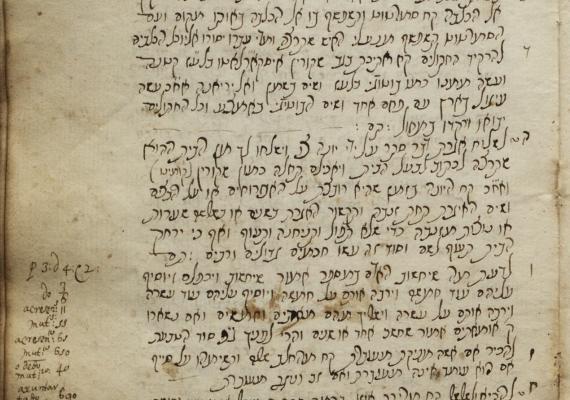Agata Paluch, Freie Universität Berlin
This paper focuses on paper—things made of it and described on its surface. In postmedieval Eastern and Central Europe, paper served as material support for inscribed texts as much as a material of which a range of objects, including those magical—were formed. Small slips of paper folded or rolled functioned as amulets deployed for a variety of purposes if inscribed with specific formulas. Slips of paper also hosted recipes for and formulas to be included on actual amuletic objects. In my talk, I draw from a largely unexplored handwritten Jewish recipe books, a textual and material format in which Jewish practical knowledge circulated between cultural (Jewish and Christian) and linguistic (Hebrew, Yiddish, Polish, and Ruthenian) milieus. These manuscripts record knowledge practices beyond the boundaries of now distinct disciplines, such as medicine, artisanry, magic, and kabbalah (Jewish mystical traditions). My paper explores paper slips as material and cultural objects that allowed for the circulation of Jewish, often the elite religious traditions and practice, within non-expert, at times lowbrow contexts outside of Jewish communities. I will draw attention to non-linear uses of Hebrew, Jewish and non-Jewish vernaculars in the fundamentally transnational early modern Jewish “paper culture.” In so doing, it reassesses the largely unstable categories of “elite” and “popular” forms of knowledges in early modern East-Central Europe.
Agata Paluch is head of the Emmy Noether Research Group “Patterns of Knowledge Circulation: The Transmission and Reception of Jewish Esoteric Knowledge in Manuscript and Print in Early Modern East-Central Europe”, funded by the DFG (German Research Council) and located at the Institut für Judaistik at the Freie Universität Berlin. She received her PhD in Hebrew and Jewish studies from University College London in 2013. Her work has focused on the interplay between Jewish and non-Jewish esoteric traditions in East-Central Europe, the histories and literatures of Jewish mysticism, and Jewish manuscript cultures in early modern Europe. She held postdoctoral fellowship from the Gerda Henkel Foundation, Herbert D. Katz Institute for Advanced Judaic Studies, and Alexander von Humboldt Foundation. She has also studied history and Jewish thought in Krakow, Warsaw, and Jerusalem and, in addition, has worked as a cataloguer of Hebrew manuscripts for the Polonsky Foundation Digitization Project at the British Library. Agata Paluch’s first book concerned Nathan Neta ben Shlomo Shapira of Kraków (1585-1633), the most famous mystical thinker stemming from the Jewish intellectual environment of Poland. Agata Paluch’s current research concerns the materiality of textual transmission, particularly in the context of the production of kabbalistic manuscripts in the age of nascent print. It examines the role and forms of Jewish manuscript culture in early modern East-Central Europe in the processes of transmission and circulation of knowledge.
